whether和if的用法区别
- 格式:doc
- 大小:381.50 KB
- 文档页数:93
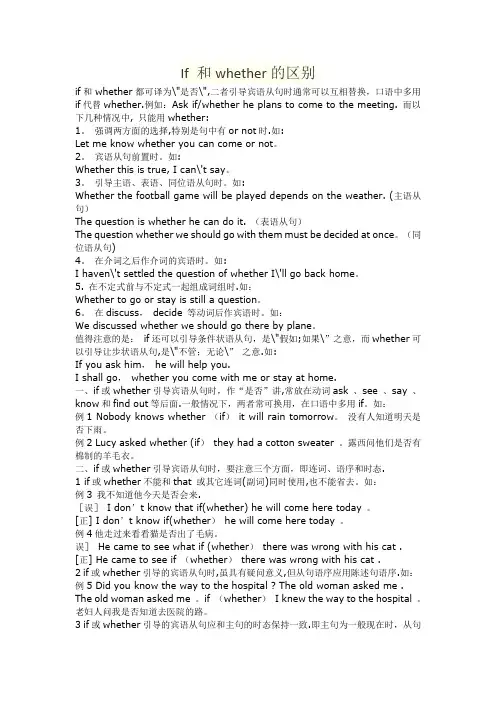
If 和whether的区别if和whether都可译为\"是否\",二者引导宾语从句时通常可以互相替换,口语中多用if代替whether.例如:Ask if/whether he plans to come to the meeting. 而以下几种情况中, 只能用whether:1。
强调两方面的选择,特别是句中有or not时.如:Let me know whether you can come or not。
2。
宾语从句前置时。
如:Whether this is true, I can\'t say。
3。
引导主语、表语、同位语从句时。
如:Whether the football game will be played depends on the weather. (主语从句)The question is whether he can do it. (表语从句)The question whether we should go with them must be decided at once。
(同位语从句)4。
在介词之后作介词的宾语时。
如:I haven\'t settled the question of whether I\'ll go back home。
5. 在不定式前与不定式一起组成词组时.如:Whether to go or stay is still a question。
6。
在discuss,decide 等动词后作宾语时。
如:We discussed whether we should go there by plane。
值得注意的是:if还可以引导条件状语从句,是\"假如;如果\”之意,而whether可以引导让步状语从句,是\"不管;无论\”之意.如:If you ask him,he will help you.I shall go,whether you come with me or stay at home.一、if或whether引导宾语从句时,作“是否”讲,常放在动词ask 、see 、say 、know和find out等后面.一般情况下,两者常可换用,在口语中多用if。
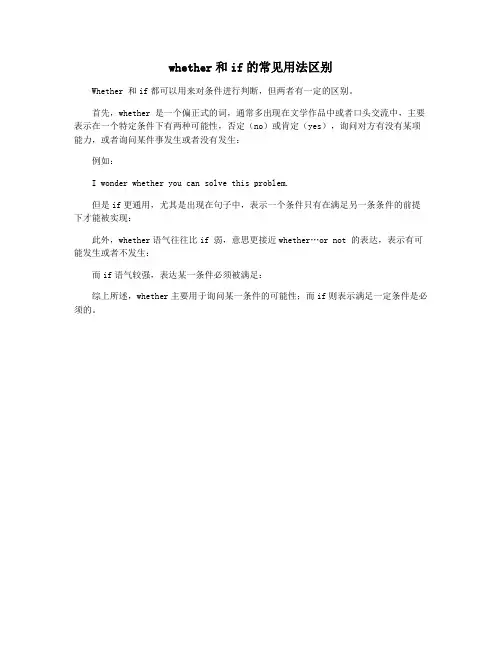
whether和if的常见用法区别
Whether 和if都可以用来对条件进行判断,但两者有一定的区别。
首先,whether 是一个偏正式的词,通常多出现在文学作品中或者口头交流中,主要表示在一个特定条件下有两种可能性,否定(no)或肯定(yes),询问对方有没有某项能力,或者询问某件事发生或者没有发生:
例如:
I wonder whether you can solve this problem.
但是if更通用,尤其是出现在句子中,表示一个条件只有在满足另一条条件的前提下才能被实现:
此外,whether语气往往比if 弱,意思更接近whether…or not 的表达,表示有可能发生或者不发生:
而if语气较强,表达某一条件必须被满足:
综上所述,whether主要用于询问某一条件的可能性;而if则表示满足一定条件是必须的。
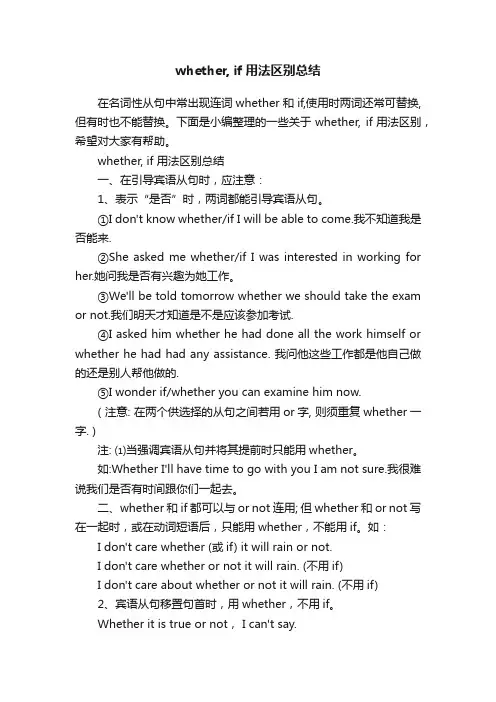
whether, if用法区别总结在名词性从句中常出现连词whether和if,使用时两词还常可替换,但有时也不能替换。
下面是小编整理的一些关于whether, if用法区别,希望对大家有帮助。
whether, if 用法区别总结一、在引导宾语从句时,应注意:1、表示“是否”时,两词都能引导宾语从句。
①I don't know whether/if I will be able to come.我不知道我是否能来.②She asked me whether/if I was interested in working for her.她问我是否有兴趣为她工作。
③We'll be told tomorrow whether we should take the exam or not.我们明天才知道是不是应该参加考试.④I asked him whether he had done all the work himself or whether he had had any assistance. 我问他这些工作都是他自己做的还是别人帮他做的.⑤I wonder if/whether you can examine him now.( 注意: 在两个供选择的从句之间若用or字, 则须重复whether一字. )注: ⑴当强调宾语从句并将其提前时只能用whether。
如:Whether I'll have time to go with you I am not sure.我很难说我们是否有时间跟你们一起去。
二、whether和if都可以与or not连用; 但whether和or not写在一起时,或在动词短语后,只能用whether,不能用if。
如:I don't care whether (或if) it will rain or not.I don't care whether or not it will rain. (不用if)I don't care about whether or not it will rain. (不用if)2、宾语从句移置句首时,用whether,不用if。
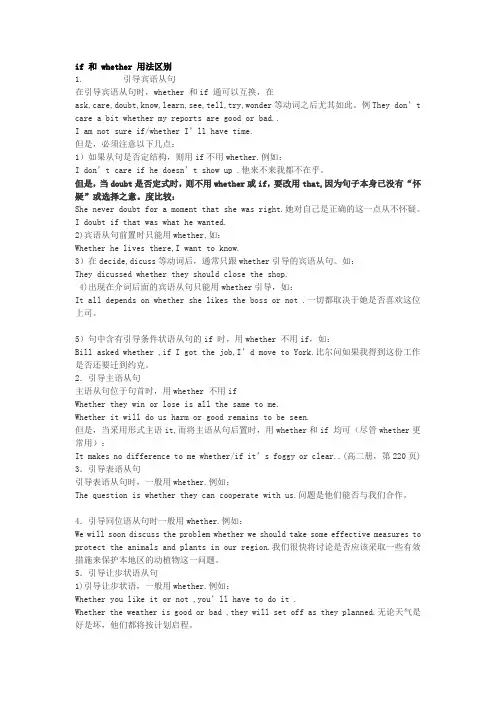
if 和 whether 用法区别1. 引导宾语从句在引导宾语从句时,whether和if通可以互换,在ask,care,doubt,know,learn,see,tell,try,wonder等动词之后尤其如此。
例They don’t care a bit whether my reports are good or bad..I am not sure if/whether I’ll have time.但是,必须注意以下几点:1)如果从句是否定结构,则用if不用whether.例如:I don’t care if he doesn’t show up .他来不来我都不在乎。
但是,当doubt是否定式时,则不用whether或if,要改用that,因为句子本身已没有“怀疑”或选择之意。
度比较:She never doubt for a moment that she was right.她对自己是正确的这一点从不怀疑。
I doubt if that was what he wanted.2)宾语从句前置时只能用whether,如:Whether he lives there,I want to know.3)在decide,dicuss等动词后,通常只跟whether引导的宾语从句。
如:They dicussed whether they should close the shop.4)出现在介词后面的宾语从句只能用whether引导,如:It all depends on whether she likes the boss or not .一切都取决于她是否喜欢这位上司。
5)句中含有引导条件状语从句的if时,用whether不用if,如:Bill asked whether ,if I got the job,I’d move to York.比尔问如果我得到这份工作是否还要迁到约克。
2.引导主语从句主语从句位于句首时,用whether不用ifWhether they win or lose is all the same to me.Whether it will do us harm or good remains to be seen.但是,当采用形式主语it,而将主语从句后置时,用whether和if均可(尽管whether更常用):It makes no difference to me whether/if it’s foggy or clear..(高二册,第220页) 3.引导表语从句引导表语从句时,一般用whether.例如:The question is whether they can cooperate with us.问题是他们能否与我们合作。
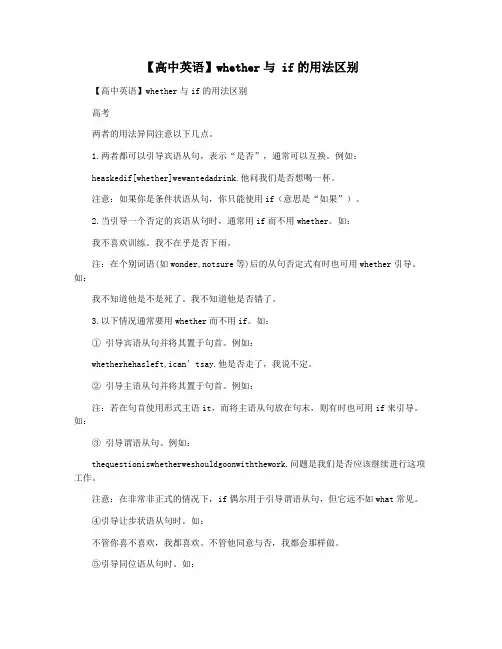
【高中英语】whether与 if的用法区别【高中英语】whether与if的用法区别高考两者的用法异同注意以下几点。
1.两者都可以引导宾语从句,表示“是否”,通常可以互换。
例如:heaskedif[whether]wewantedadrink.他问我们是否想喝一杯。
注意:如果你是条件状语从句,你只能使用if(意思是“如果”)。
2.当引导一个否定的宾语从句时,通常用if而不用whether。
如:我不喜欢训练。
我不在乎是否下雨。
注:在个别词语(如wonder,notsure等)后的从句否定式有时也可用whether引导。
如:我不知道他是不是死了。
我不知道他是否错了。
3.以下情况通常要用whether而不用if。
如:① 引导宾语从句并将其置于句首。
例如:whetherhehasleft,ican’tsay.他是否走了,我说不定。
② 引导主语从句并将其置于句首。
例如:注:若在句首使用形式主语it,而将主语从句放在句末,则有时也可用if来引导。
如:③ 引导谓语从句。
例如:thequestioniswhetherweshouldgoonwiththework.问题是我们是否应该继续进行这项工作。
注意:在非常非正式的情况下,if偶尔用于引导谓语从句,但它远不如what常见。
④引导让步状语从句时。
如:不管你喜不喜欢,我都喜欢。
不管他同意与否,我都会那样做。
⑤引导同位语从句时。
如:他们是否需要的问题没有被考虑。
我们是否需要它还没有考虑。
⑥用于不定式之前时。
如:我不确定他们是否要离开。
我不知道是留下还是离开。
ididn’tknowwhethertolaughortocry.我真是哭笑不得。
⑦ 在介词后使用。
例如:itdependsonwhethertheletterarrivesintime.这取决于信是否来得及时。
我不知道自己的感受如何。
我担心伤害她的感情。
注:若不是直接与ornot用在一起,则有时也可用if。
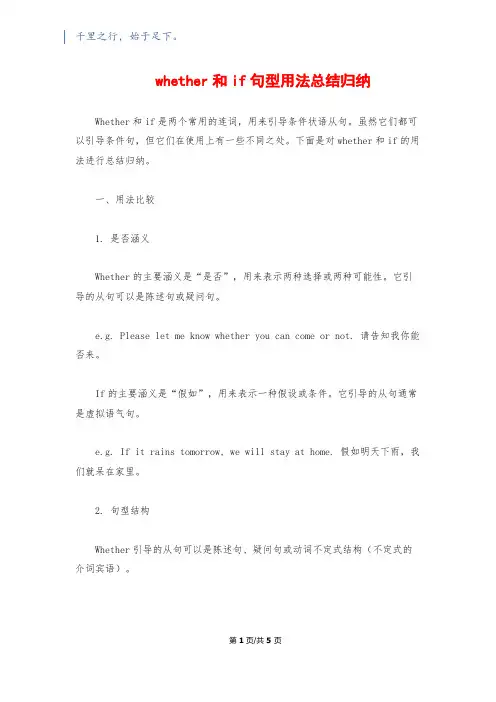
whether和if句型用法总结归纳Whether和if是两个常用的连词,用来引导条件状语从句。
虽然它们都可以引导条件句,但它们在使用上有一些不同之处。
下面是对whether和if的用法进行总结归纳。
一、用法比较1. 是否涵义Whether的主要涵义是“是否”,用来表示两种选择或两种可能性。
它引导的从句可以是陈述句或疑问句。
e.g. Please let me know whether you can come or not. 请告知我你能否来。
If的主要涵义是“假如”,用来表示一种假设或条件。
它引导的从句通常是虚拟语气句。
e.g. If it rains tomorrow, we will stay at home. 假如明天下雨,我们就呆在家里。
2. 句型结构Whether引导的从句可以是陈述句、疑问句或动词不定式结构(不定式的介词宾语)。
第1页/共5页e.g. She asked me whether I had finished the report. 她问我是否已经写完报告。
My boss is deciding whether to promote me. 我的老板在打算是否要提升我。
If引导的从句通常是陈述句、疑问句或虚拟语气句。
e.g. I don't know if he will come or not. 我不知道他会不会来。
If you need any help, just let me know. 假如你需要任何挂念,告知我。
If I were you, I would quit my job. 假如我是你,我就辞职。
3. 语气和真实性Whether引导的从句一般表示对信息的确认或否定,语气较为客观。
其后的句子常带有一些客观性的动词,如know, determine, decide等。
e.g. We need to know whether the meeting will be held as scheduled. 我们需要知道会议是否按方案进行。
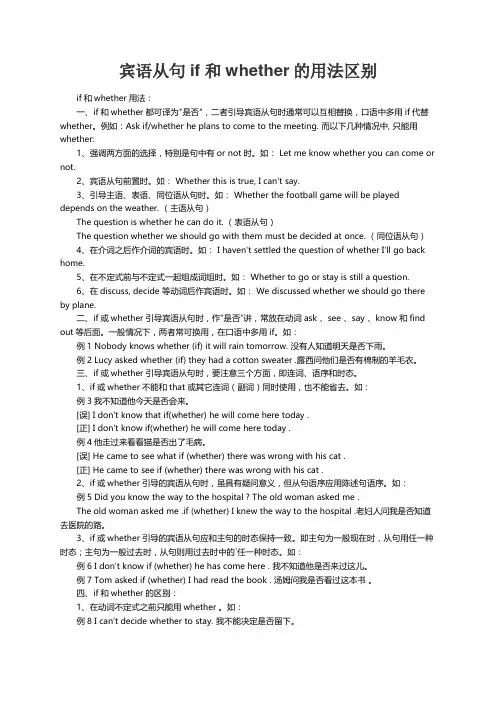
宾语从句if 和whether的用法区别if和whether用法:一、if和whether都可译为"是否",二者引导宾语从句时通常可以互相替换,口语中多用if代替whether。
例如:Ask if/whether he plans to come to the meeting. 而以下几种情况中, 只能用whether:1、强调两方面的选择,特别是句中有or not时。
如: Let me know whether you can come or not.2、宾语从句前置时。
如: Whether this is true, I can't say.3、引导主语、表语、同位语从句时。
如: Whether the football game will be played depends on the weather. (主语从句)The question is whether he can do it. (表语从句)The question whether we should go with them must be decided at once. (同位语从句)4、在介词之后作介词的宾语时。
如: I haven't settled the question of whether I'll go back home.5、在不定式前与不定式一起组成词组时。
如: Whether to go or stay is still a question.6、在discuss, decide 等动词后作宾语时。
如: We discussed whether we should go there by plane.二、if或whether引导宾语从句时,作“是否”讲,常放在动词ask 、see 、say 、know和find out等后面。
一般情况下,两者常可换用,在口语中多用if。
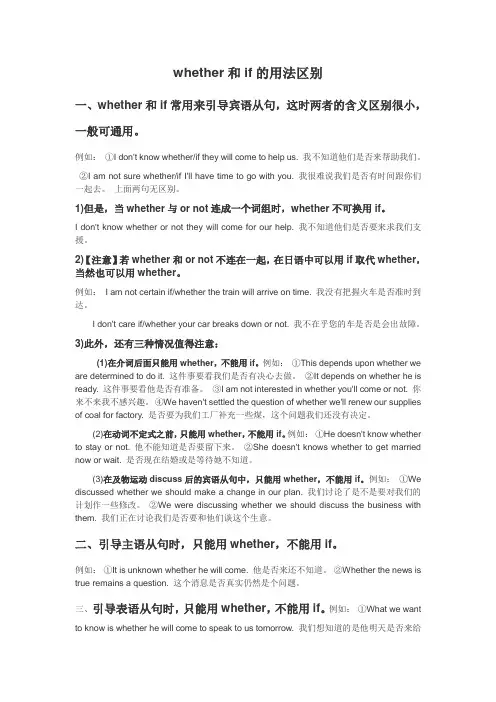
whether和if的用法区别一、whether和if常用来引导宾语从句,这时两者的含义区别很小,一般可通用。
例如:①I don't know whether/if they will come to help us. 我不知道他们是否来帮助我们。
②I am not sure whether/if I'll have time to go with you. 我很难说我们是否有时间跟你们一起去。
上面两句无区别。
1)但是,当whether与or not连成一个词组时,whether不可换用if。
I don't know whether or not they will come for our help. 我不知道他们是否要来求我们支援。
2)【注意】若whether和or not不连在一起,在日语中可以用if取代whether,当然也可以用whether。
例如:I am not certain if/whether the train will arrive on time. 我没有把握火车是否准时到达。
I don't care if/whether your car breaks down or not. 我不在乎您的车是否是会出故障。
3)此外,还有三种情况值得注意:(1)在介词后面只能用whether,不能用if。
例如:①This depends upon whether we are determined to do it. 这件事要看我们是否有决心去做。
②It depends on whether he is ready. 这件事要看他是否有准备。
③I am not interested in whether you'll come or not. 你来不来我不感兴趣。
④We haven't settled the question of whether we'll renew our supplies of coal for factory. 是否要为我们工厂补充一些煤,这个问题我们还没有决定。
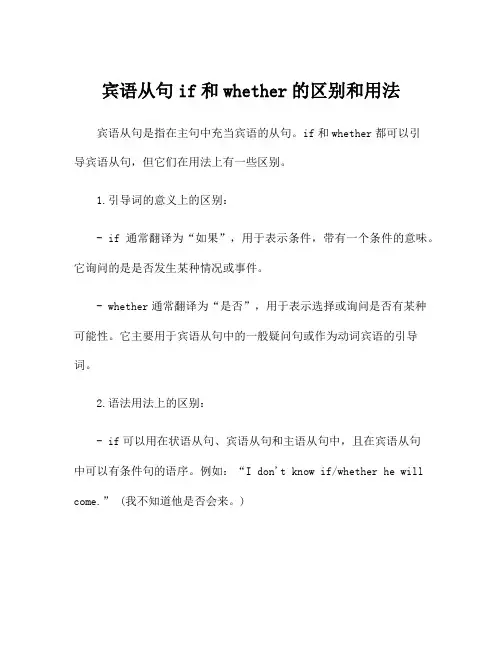
宾语从句if和whether的区别和用法宾语从句是指在主句中充当宾语的从句。
if和whether都可以引导宾语从句,但它们在用法上有一些区别。
1.引导词的意义上的区别:- if通常翻译为“如果”,用于表示条件,带有一个条件的意味。
它询问的是是否发生某种情况或事件。
- whether通常翻译为“是否”,用于表示选择或询问是否有某种可能性。
它主要用于宾语从句中的一般疑问句或作为动词宾语的引导词。
2.语法用法上的区别:- if可以用在状语从句、宾语从句和主语从句中,且在宾语从句中可以有条件句的语序。
例如:“I don't know if/whether he will come.” (我不知道他是否会来。
)- whether主要用在宾语从句中,表示两个或多个选项或可能性。
例如:“She asked me whether I prefer tea or coffee.” (她问我喜欢茶还是咖啡。
)需要注意的是,下面两种情况只能使用whether而不能使用if:-在介词后面引导的宾语从句,例如:“I'm not sure about whether he will come or not.” (我不确定他是否会来。
) -在不及物动词后面引导的宾语从句,例如:“They wonder whether it is going to rain tomorrow.” (他们想知道明天是否会下雨。
)此外,如果主句有助动词或情态动词,那么在宾语从句中只能使用whether。
例如:“They want to kno w whether he can speak Spanish.” (他们想知道他是否会说西班牙语。
)总之,if更偏向于表示条件,而whether更偏向于表示选择或可能性。
在实际运用中,根据句子的具体语境和需要选择合适的引导词。
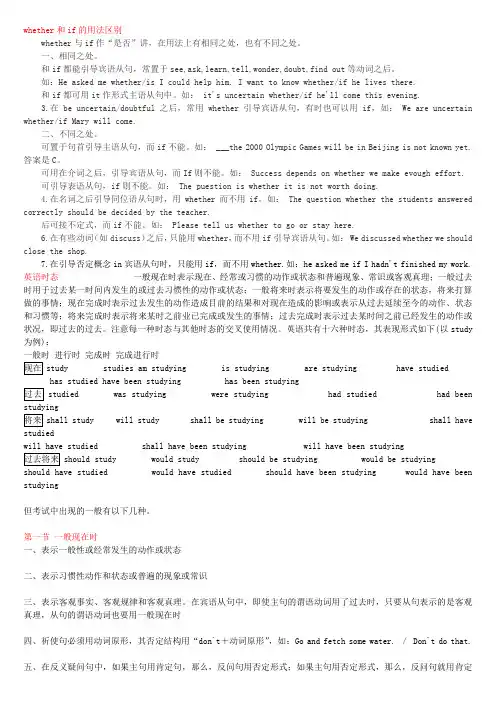
whether和if的用法区别whether与if作“是否”讲,在用法上有相同之处,也有不同之处。
一、相同之处。
和if都能引导宾语从句,常置于see,ask,learn,tell,wonder,doubt,find out等动词之后。
如:He asked me whether/is I could help him. I want to know whether/if he lives there.和if都可用it作形式主语从句中。
如: it's uncertain whether/if he'll come this evening.3.在be uncertain/doubtful之后,常用whether引导宾语从句,有时也可以用if,如: We are uncertain whether/if Mary will come.二、不同之处。
可置于句首引导主语从句,而if不能。
如: ___the 2000 Olympic Games will be in Beijing is not known yet. 答案是C。
可用在介词之后,引导宾语从句,而If则不能。
如: Success depends on whether we make evough effort.可引导表语从句,if则不能。
如: The puestion is whether it is not worth doing.4.在名词之后引导同位语从句时,用whether而不用if。
如: The question whether the students answered correctly should be decided by the teacher.后可接不定式,而if不能。
如: Please tell us whether to go or stay here.6.在有些动词(如discuss)之后,只能用whether,而不用if引导宾语从句。
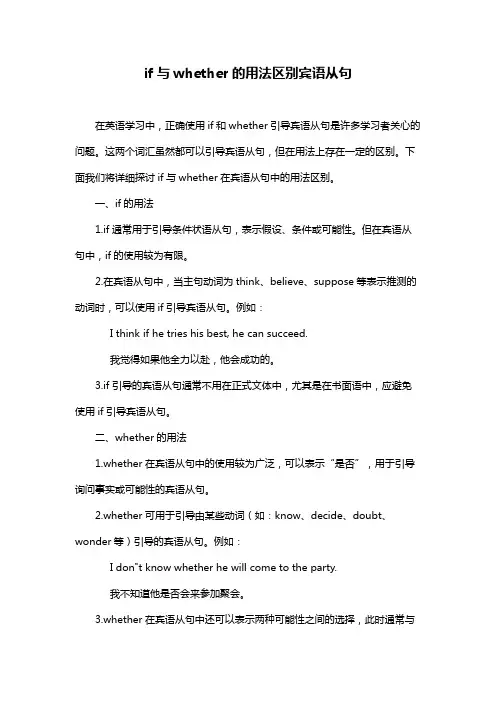
if与whether的用法区别宾语从句在英语学习中,正确使用if和whether引导宾语从句是许多学习者关心的问题。
这两个词汇虽然都可以引导宾语从句,但在用法上存在一定的区别。
下面我们将详细探讨if与whether在宾语从句中的用法区别。
一、if的用法1.if通常用于引导条件状语从句,表示假设、条件或可能性。
但在宾语从句中,if的使用较为有限。
2.在宾语从句中,当主句动词为think、believe、suppose等表示推测的动词时,可以使用if引导宾语从句。
例如:I think if he tries his best, he can succeed.我觉得如果他全力以赴,他会成功的。
3.if引导的宾语从句通常不用在正式文体中,尤其是在书面语中,应避免使用if引导宾语从句。
二、whether的用法1.whether在宾语从句中的使用较为广泛,可以表示“是否”,用于引导询问事实或可能性的宾语从句。
2.whether可用于引导由某些动词(如:know、decide、doubt、wonder等)引导的宾语从句。
例如:I don"t know whether he will come to the party.我不知道他是否会来参加聚会。
3.whether在宾语从句中还可以表示两种可能性之间的选择,此时通常与or连用。
例如:You can choose whether to go or stay.你可以选择去还是留。
4.whether在宾语从句中可用于表示强调语气,尤其是在主句动词为insist、demand等表示强调的动词时。
例如:He insists that we discuss whether the plan is feasible.他坚持要我们讨论这个计划是否可行。
三、总结1.if与whether在宾语从句中的主要区别在于使用场合和语境。
2.if主要用于引导条件状语从句,而在宾语从句中使用较少,通常用于非正式语境。
whether和if的区别有哪些不同whether和if的区别主要有含义不同、用法不同、侧重点不同。
引导宾语从句,一般既可用whether也可用if,if和whether在宾语从句中,都表“是否”,可换用,if更口语化,whether正式些。
当有or not时,一般用whether,而不用if。
在强调任意选择时,用whether…or,此时不用if替换whether。
whether和if的区别有哪些不同1whether和if的区别一、含义不同1、whetherconj. 是否;不管;无论。
2、ifconj. 如果;即使;每当;n. 条件;设想。
二、用法不同1、whetherwhether用作连词,意思是“是否,是不是”,可引导名词从句或动词不定式短语。
whether还可引导让步状语从句,意思是“不管,无论”,从句中通常用一般现代时代替将来时。
2、ifif引导条件状语从句,从句可为真实条件从句,也可为虚拟条件从句。
如为真实条件从句,谓语用陈述语气,表示可能性很大,作“假使”“如果”解,通常用一般现在时代替一般将来时; 如果if从句中用will,表示意愿。
从句如为虚拟条件从句,谓语动词要用虚拟语气,表示可能性不大或与过去事实相反,作“要是,假如”解。
可指过去的情况,也可指现在和将来的情况。
指将来情况时可用were to 或should。
三、侧重点不同1、whether意思是“假使,如果”时,whether从句单纯表示事实;whether 可以用在介词之后的间接疑问句中;whether可以用在“to+动词原形”的前面;whether可以引导主语、表语从句。
意思是“是否”时,whether多用于书面语中,可与or或or not连用,除引出宾语从句外,还可引出主语从句、表语从句、同位语从句或与不定式连用。
2、if意思是“假使,如果”时,if从句可以表示希望;if不能用在介词之后的间接疑问句中;if不能用在“to+动词原形”的前面;if不能引导主语、表语从句。
1、引导宾语从句在引导宾语从句时,whether 和if 通可以互换,在ask,care,doub,know,learn,msee,tell,try,wonder等动词之后尤其如此。
例如:I don‟t know if/whether I can help you.They don‟t care a bit whether my reports are good or bad..I wonder if you can examine him now.(高一册第十四页)I am not sure if/whether I‟ll have time.但是,必须注意以下几点:1)如果从句是否定结构,则用if不用whether.例如:Well,think,and see if the most religious people aren‟t those who fell that this life doesn‟t gice t hem all they want.好,你想,那最虔诚的宗教徒,是不是就是那此觉得这现实的人生没有完全满足自己欲望的人?Dinner was almost over when Dan,still looking hungry,grinned and asked Dave if he wasn‟t g oing to have some bread.晚饭快吃完的时候丹(他看上去还没吃饱)笑着问戴维还要不要吃些面包。
I don‟t care if he doesn‟t show up .他来不来我都不在乎。
Let me know if you can‟t meet me at Jackson and Throop Streets Wednesday afternoon at two o‟clock.星期三下午奉告警方,你是否能在杰逊街和思鲁街的黑心角来跟我相会。
(<嘉莉妹妹>=当然,对某些句子,人们可能会有不同的理解。
一、whether和if都可以用作连词,引导一个名词性从句,表示“是否”。
whether可以引导主语从句、表语从句、宾语从句和同位语从句;而if只能引导宾语从句。
1.引导宾语从句既可以用whether,也可以用if,两者常可以互换。
whether从正反两个方面提出疑问,选择意义较强,多用于正式文体中;而if多用于口语,比较强调单方面,如:He asked me whether / if I could lend him my bike. Could you tell us whether / if it snows in winter in Australia?I want to know whether / if you can come or not. She asked them whether / if they had gone there by car or by train.值得注意的是:① whether 和if都可以和or not连用,但是whether之后可以直接跟or not,而if则不能,如:I don’t care whether or not your car breaks down.I don’t know whether or not he’s coming.但是不可以说:I don’t care if or not your car breaksdown.② whether引导的从句一般不可以为否定结构(选择问句的后一部分除外);而if则可以跟否定结构,如:I don’t care if she doesn’t come.I don’t care if it doesn’t rain.但是,在某些动词或形容词之后,则可以用whether引导一个否定结构的句子,这种结构往往表示肯定的含义,如:I wonder whether he doesn’t think too much of himself. 其意思相当于:I think he does think too much of himself.③在个别动词之后,如discuss 等,只跟用whether引导的宾语从句,如:They discussed whether they should close the shop. We discussed whether Mary could join us.④ whether 可以引导从句作介词的宾语,而if则不能,如:I’m not interested in whether they’ll go or not. It depends on whether we have got enough money.⑤ whether可以直接跟动词不定式连用,而if则不能,如:I didn’t know whether to laugh or to cry.She hasn’t decided whether to go or not.He was wondering whether to go home or stay at school. 2.引导主语从句(包括从句在句首的位置)应当用whether,不用if,如:Whether it is true remains a problem.Whether he can stay with us is another matter. Whether he will come, I am not sure.Whether or not he did it, I cannot tell.3.引导表语从句用whether,不用if,如:The question is whether you should accept it.The question is whether he will speak at the meeting.4.引导同位语从句用whether,不用if,如:The question whether he’ll attend the meeting is essential.I am in doubt whether I should agree to the plan.二、whether 还可以引导让步状语从句,意为“不管;无论”;而if则不能引导这种从句,如:I shall tell her about it whether you agree or not. Whether or not the figures are accurate, we have to recheck them.Whether or not we had a baby, we could not survive just on my salary.三、if还可以引导条件状语从句,意为“如果;假如”,而whether则不能引导这种从句,如:We shall do this experiment if we have time.四、如果在从句中使用if表示“是否”容易与表示条件的状语从句混淆时,应注意避免使用if,例如:Please let us know if they are coming. 这句话可以理解为“如果他们要来,请通知我们一下。
if和whether的区别引言在英语中,if和whether都可以用于引导一个名词从句或一个简单句来询问或表示条件。
尽管它们在某些情况下可以互换使用,但对于一些具体的用法和语境,它们之间还是有一些区别的。
本文将详细解释if和whether之间的区别,并提供一些实例来说明它们的用法。
if的用法1.表示条件:if用于引导一个条件从句,表示一个条件可能发生或未发生的情况。
例如:–If it rains, we will stay at home.(如果下雨,我们会呆在家里。
)–I will go to the party if I finish my work.(如果我完成了工作,我会去参加聚会。
)2.带有假设性的情况:if还可以用于表达假设或假设的情况。
例如:–If I were rich, I would travel the world.(如果我富有,我会环游世界。
)–If I had studied harder, I would have passed the exam.(如果我学得更努力,我就能通过考试。
)3.引导间接疑问句:if可以用于引导间接疑问句,询问某事是否可能或是否会发生。
例如:–He asked if I could help him with hispresentation.(他问我是否可以帮他做演讲。
)–I wonder if she knows the answer.(我想知道她是否知道答案。
)whether的用法1.引导选择疑问句:whether通常用于引导选择疑问句,询问两个或多个选择之间的一个。
例如:–I don’t know whether to go to the party or stay at home.(我不知道是去参加聚会还是呆在家里。
)–Could you tell me whether the store is open on Sundays?(你能告诉我星期天店铺是否开门吗?)2.引导宾语从句:whether可以用于引导宾语从句,表示一种选择或询问。
高考英语之whether和if的词语辨析和用法Whether和if是两个表示“是否”的词语,在英语中,它们常常用来引导宾语从句或者作为连词使用。
但是,很多学生容易混淆这两个词语的用法。
本文将在以下几个方面对whether和if的用法进行辨析。
1. 用法Whether和if都可以用来引导宾语从句,表示“是否”。
例如:I don't know whether/if he'll come tomorrow. 我不知道他明天是否会来。
注意:在口语中,if比whether更常用。
2. 是否强调两个选项Whether常常用来表示两个选项,或者是两个事情中的任意一件。
例如:They are discussing whether to go to France or Italy. 他们在讨论是去法国还是意大利。
If通常表示“如果……”,没有强调任何选项或者事情。
例如:If you work hard, you will succeed. 如果你努力工作,你会成功。
3. 是否使用条件句If可以用来引导条件句,强调条件和结果之间的关系。
例如:Whether不能用来引导条件句,只能引导宾语从句。
4. 是否用于疑问句Whether you like it or not, we are going to see the movie tonight. 不管你喜不喜欢,今晚我们要去看电影。
If you could go anywhere in the world, where would you go? 如果你可以去世界上任何地方,你会去哪里?Whether可以用于问句后面作为强调。
例如:If不能用于问句后面作为强调。
6. 是否可以简化成whether或if后面直接跟动词原形注意:这种省略方式比较口语化,不建议在正式场合使用。
总之,whether和if都是很常用的词语,在使用时需要注意它们的用法和区别。
希望本文对大家有所帮助。
whether和if的用法区别whether与if作“是否”讲,在用法上有相同之处,也有不同之处。
一、相同之处。
1.whether和if都能引导宾语从句,常置于see,ask,learn,tell,wonder,doubt,find out等动词之后。
如:He asked me whether/is I could help him. I want to know whether/if he lives there.2.whether和if都可用it作形式主语从句中。
如:it's uncertain whether/if he'll come this evening.3.在be uncertain/doubtful之后,常用whether引导宾语从句,有时也可以用if,如:We are uncertain whether/if Mary will come.二、不同之处。
1.whether可置于句首引导主语从句,而if不能。
如:___the 2000 Olympic Games will be in Beijing is not known yet.A.whetherB.IfC.WhetherD.That 答案是C。
2.whether可用在介词之后,引导宾语从句,而If则不能。
如:Success depends on whether we make evough effort.3.whether可引导表语从句,if则不能。
如:The puestion is whether it is not worth doing.4.在名词之后引导同位语从句时,用whether而不用if。
如:The question whether the students answered correctly should be decided by the teacher.5.whether后可接不定式,而if不能。
如:Please tell us whether to go or stay here.6.在有些动词(如discuss)之后,只能用whether,而不用if引导宾语从句。
如:We discussed whether we should close the shop.7.在引导否定概念in宾语从句时,只能用if,而不用whether.如:he asked me if I hadn't finished my work.英语时态一般现在时表示现在、经常或习惯的动作或状态和普遍现象、常识或客观真理;一般过去时用于过去某一时间内发生的或过去习惯性的动作或状态;一般将来时表示将要发生的动作或存在的状态,将来打算做的事情;现在完成时表示过去发生的动作造成目前的结果和对现在造成的影响或表示从过去延续至今的动作、状态和习惯等;将来完成时表示将来某时之前业已完成或发生的事情;过去完成时表示过去某时间之前已经发生的动作或状况,即过去的过去。
注意每一种时态与其他时态的交叉使用情况。
英语共有十六种时态,其表现形式如下(以study为例):一般时进行时完成时完成进行时study studies am studying is studying are studying have studiedhas studied have been studying has been studyingstudied was studying were studying had studied had been studyingshall study will study shall be studying will be studying shall have studiedshall have been studying will have been studyingshould study would study should be studying would be studyingshould have studied would have studied should have been studying would have been studying但考试中出现的一般有以下几种。
第一节一般现在时一、表示一般性或经常发生的动作或状态二、表示习惯性动作和状态或普遍的现象或常识三、表示客观事实、客观规律和客观真理。
在宾语从句中,即使主句的谓语动词用了过去时,只要从句表示的是客观真理,从句的谓语动词也要用一般现在时四、祈使句必须用动词原形,其否定结构用“don`t+动词原形”,如:Go and fetch some water. /Don`t do that.五、在反义疑问句中,如果主句用肯定句,那么,反问句用否定形式;如果主句用否定形式,那么,反问句就用肯定形式。
而且前后在时态上要一致。
但祈使疑问句用won`t you?进行反问。
如:See a film tonight, won`t you?注:①祈使句后边可用附加疑问句,以加强语气。
如果祈使句用肯定形式,附加疑问句用否定形式;如果祈使句用否定形式,附加句用肯定形式;如:Come here next Sunday, won`t you? /Don`t tell it to anyone, will you?②但如果祈使句的前一句有了表示强烈肯定的语言环境,即使祈使句用了肯定形式,其附加成分也可以用“will you”(表示肯定,如果是在口语中用降调)。
如:Give me the book, will you?第二节一般过去时一、一般过去时主要表示过去某一时刻发生的动作或情况,句中通常有表示过去某一时刻的状语a day ago, last week, in 1996, during the night, in anceint times等,表示“过多少时间之后”用after, 但在现在完成时中用in, 如in the past few years 等第三节一般将来时一、一般将来时表示将要发生的动作或状况二、在表示时间和条件的状语从句中,一般现在时代替一般将来时。
这些时间副词有when, as soon as等,表示条件的连词有if,as long as等三、一些表示方向及变化的瞬间动词可用进行时或现在时表示将要发生的动作We leave (are leaving) for California the day after tomorrow.我们(计划)后天动身去加利福尼亚州。
May I have your attention please. The plane for Wuhan is about to take off.请注意,飞往武汉的飞机就要起飞了。
四、另外,“be +to +动词原形”也可表示打算做的事,还可表示责任、意向和可能性You are to follow the doctor’s advice.你应遵从医嘱。
No shelter was to be seen.找不到避难处。
第四节现在完成时一、现在完成时的构成式是have(has)+动词的ED分词二、现在完成时表示到现在为止的一段时间内发生的情况或动作,强调的是对现在的影响,可能是已完成的动作,也可表示多次动作的总和,或习惯性的行为和持续的动作三、如果句中有表示到现在为止这段时间的状语时,用现在完成时,这些时间状语有now, today, this week, this month, this year,现在完成时不和表示具体的时间状语连用,如yesterday, last year等,但可以和always, before, just, in/during the past(few weeks, years, fifty years)连用,这时in表示“过去多少时间”,不能用after四、在有already, as yet, yet, ever, just, never 这类副词作状语的情况下,用现在完成时五、有“since+时间点,for+一段时间”引导的状语时,主句谓语用现在完成时态11) Jekyll Island has been one [A]of Georgia’s state [B]parks [C]in [D]1954.12) He is [A]in this country now [B]for five years,but he makes [C]no attempt to speak [D]our language.13) The Browns [A]are living a hard [B]life because Mr. Brown has been unemployed [C]since [D]half a year.六、现在完成时用于将来的情况,即主语为一般将来时,时间和条件从句中的谓语用现在完成时(而不能用将来完成时)表示将来某时完成的动作第五节将来完成时和过去完成时一、将来完成时表示将来某时业已发生的动作和情况,或已经存在的状态二、过去完成时表示在过去某一时刻之前业已发生了的动作或现象,句中通常会出现有表示过去某一时刻的时间状语第六节进行时态一、现在进行时表示现在或现阶段进行的动作,但也和always, constantly, forever等频度副词连用表示一个经常进行的动作或现在存在的状态二、瞬间动词和一些表示状态及感觉的动词一般不用进行时,而用一般现在时或一般过去时代替。
这些动词包括:appear(显然), arrive, be, come, desire, go, find, hate, hope, join, know, leave, like, love, join, possess, start, sail, see, suggest, taste, think(认为), understand等,类似的动词还有belong to,consist of,seem(似乎)等三、过去完成进行时过去完成进行时表示到过去的某一时间点或某一时间段里一直在进行的动作或行为5) They received the parcel that they for a long time.[A]expected [B]have expected [C]had been expecting [D]had expectedThere is a well known incident in one of Moliere′s plays, where the author makes the hero express unbounded delight on being told that he had been talking prose during the whole of his life.(93年翻译)四、例题解析1) D错。